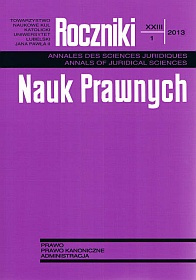Freedom of Assembly Under the Law of Second Polish Republic
Abstract
The provision of freedom of assembly is one of the basic standards of a democratic state of law. It embodies citizens’ right to a peaceful manifestation of their views. Unfortunately, after 1918 this law was put into practice in Poland based on regional laws. Only in 1932 a uniform law on assemblies was passed, which was regrettably drafted in the wake of events after 1926, i.e. those resulting from the State monitoring its citizens. This law brought a number of restrictions, seemingly unnecessary, of administrative character concerning calling and managing assemblies – and they may distort the ideals of freedom of assembly when studied by modern scholars.
Copyright (c) 2013 Roczniki Nauk Prawnych

This work is licensed under a Creative Commons Attribution-NonCommercial-NoDerivatives 4.0 International License.


